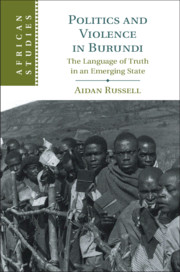Book contents
- Politics and Violence in Burundi
- African Studies Series
- Politics and Violence in Burundi
- Copyright page
- Contents
- Figures and Maps
- Acknowledgements
- Linguistic and Orthographic Note
- Glossary of Terms
- List of Abbreviations
- Introduction
- Prologue, 1796–1959
- Part I 1959–1961: ‘To See the Son of a King’
- Part II 1961–1967: ‘A Most Total Anarchy’
- 3 Abanyabihuha
- 4 Ukuri n’ubutungane
- Part III 1968–1972: ‘Please Send Me a Car to Take Them Away’
- Conclusion
- Bibliography
- Index
- African Studies Series
3 - Abanyabihuha
Talking Loyalty
from Part II - 1961–1967: ‘A Most Total Anarchy’
Published online by Cambridge University Press: 03 October 2019
- Politics and Violence in Burundi
- African Studies Series
- Politics and Violence in Burundi
- Copyright page
- Contents
- Figures and Maps
- Acknowledgements
- Linguistic and Orthographic Note
- Glossary of Terms
- List of Abbreviations
- Introduction
- Prologue, 1796–1959
- Part I 1959–1961: ‘To See the Son of a King’
- Part II 1961–1967: ‘A Most Total Anarchy’
- 3 Abanyabihuha
- 4 Ukuri n’ubutungane
- Part III 1968–1972: ‘Please Send Me a Car to Take Them Away’
- Conclusion
- Bibliography
- Index
- African Studies Series
Summary
After independence, Burundi went through a process of rapid political disintegration. Uprona factionalised into political and ethnic blocs, while facing off against Rwanda as an ideological and geopolitical enemy. This chapter explores the rapid changes between 1962 and 1967, seeing the attempts to rule in the control of official truth. It examines the extreme hostility of the state towards the borderland population, and the forms of political language used in national address. It presents a moment of violence in 1964 when dissidents ran a campaign of arson from across the border, and the performances of loyalty enacted by others to display their obedience to official truth. Noting the national crisis over Prime Minister Ngendandumwe’s assassination in 1965, and the subsequent elections, attempted coups d’état and the first large-scale ethnic violence, it finally presents local responses to a military coup in 1966 that abolished the monarchy. Some resisted the coup by treating it as just another ‘rumour’, but most greeted the news with cautious silence. Official truth changed to exclude royal authority, but maintained old hostilities to Rwanda, rumour and ethnic politics.
- Type
- Chapter
- Information
- Politics and Violence in BurundiThe Language of Truth in an Emerging State, pp. 131 - 165Publisher: Cambridge University PressPrint publication year: 2019

